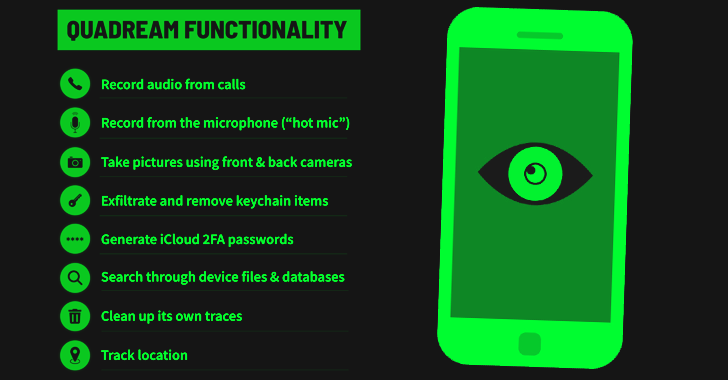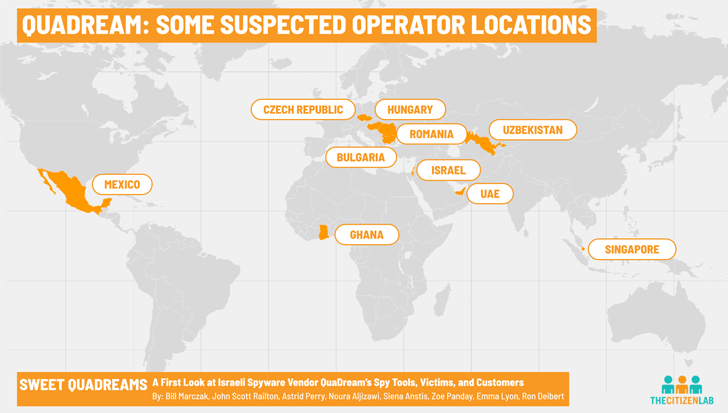Threat actors using hacking tools from an Israeli surveillanceware vendor named QuaDream targeted at least five members of civil society in North America, Central Asia, Southeast Asia, Europe, and the Middle East.
According to findings from a group of researchers from the Citizen Lab, the spyware campaign was directed against journalists, political opposition figures, and an NGO worker in 2021. The names of the victims were not disclosed.
It’s also suspected that the company abused a zero-click exploit dubbed ENDOFDAYS in iOS 14 to deploy spyware as a zero-day in version 14.4 and 14.4.2. There is no evidence that the exploit has been used after March 2021.
ENDOFDAYS “appears to make use of invisible iCloud calendar invitations sent from the spyware’s operator to victims,” the researchers said.
The Microsoft Threat Intelligence team is tracking QuaDream as DEV-0196, describing the cyber mercenary company as a private sector offensive actor (PSOA). While QuaDream is not directly involved in targeting, it is known to sell its “exploitation services and malware” to government customers, the tech giant assessed with high confidence.
The malware, named KingsPawn, contains a monitor agent and the primary malware agent, both of which are Mach-O files written in Objective-C and Go, respectively.
While the monitor agent is responsible for reducing the forensic footprint of the malware to evade detection, the main agent comes with capabilities to gather device information, cellular and Wi-Fi data, harvest files, access camera in the background, access location, call logs, and iOS Keychain, and even generate an iCloud time-based one-time password (TOTP).
Other samples support recording audio from phone calls and the microphone, running queries in SQL databases, and cleaning up forensic trails, such as deleting all calendar events from two years prior to the current time. The data is exfiltrated via HTTPS POST requests.
Internet scans carried out by the Citizen Lab reveal that QuaDream’s customers operated 600 servers from several countries around the world between late 2021 and early 2023, including Bulgaria, Czech Republic, Hungary, Romania, Ghana, Israel, Mexico, Singapore, the U.A.E., and Uzbekistan.
Despite attempts made by the spyware to cover its tracks, the interdisciplinary laboratory said it was able to uncover unspecified traces of what it calls the “Ectoplasm Factor” that could be used to track QuaDream’s toolset in the future.
This is not the first time QuaDream has attracted attention. In February 2022, Reuters reported that the company weaponized the FORCEDENTRY zero-click exploit in iMessage to deploy a spyware solution named REIGN.
Then in December 2022, Meta disclosed that it took down a network of 250 fake accounts on Facebook and Instagram controlled by QuaDream to infect Android and iOS devices and exfiltrate personal data.
Learn to Secure the Identity Perimeter – Proven Strategies
Improve your business security with our upcoming expert-led cybersecurity webinar: Explore Identity Perimeter strategies!
If anything, the development is yet another indication that despite the notoriety attracted by NSO Group, commercial spyware firms continue to fly under the radar and develop sophisticated spyware products for use by government clients.
“Until the out-of-control proliferation of commercial spyware is successfully curtailed through systemic government regulations, the number of abuse cases is likely to continue to grow, fueled both by companies with recognizable names, as well as others still operating in the shadows,” the Citizen Lab said.
Calling the growth of mercenary spyware companies as a threat to democracy and human rights, Microsoft said combating such offensive actors requires a “collective effort” and a “multistakeholder collaboration.”
“Moreover, it is only a matter of time before the use of the tools and technologies they sell spread even further,” Amy Hogan-Burney, the company’s associate general counsel for cybersecurity policy and protection, said.
“This poses real risk to human rights online, but also to the security and stability of the broader online environment. The services they offer require cyber mercenaries to stockpile vulnerabilities and search for new ways to access networks without authorization.”

